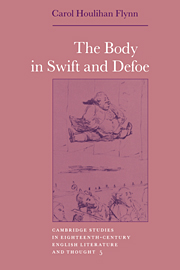Book contents
- Frontmatter
- Contents
- Acknowledgments
- List of abbreviations
- Introduction “The Dearness of things”: the body as matter for text
- 1 Dull organs: the matter of the body in the plague year
- 2 The burthen in the belly
- 3 Consuming desires: Defoe's sexual systems
- 4 Flesh and blood: Swift's sexual strategies
- 5 The ladies: d—ned, insolent, proud, unmannerly sluts
- 6 Chains of consumption: the bodies of the poor
- 7 Consumptive fictions: cannibalism in Defoe and Swift
- 8 Vital parts: Swift's necessary metaphors
- Afterword Suppose me dead; and then suppose
- Index
Introduction “The Dearness of things”: the body as matter for text
Published online by Cambridge University Press: 21 September 2009
- Frontmatter
- Contents
- Acknowledgments
- List of abbreviations
- Introduction “The Dearness of things”: the body as matter for text
- 1 Dull organs: the matter of the body in the plague year
- 2 The burthen in the belly
- 3 Consuming desires: Defoe's sexual systems
- 4 Flesh and blood: Swift's sexual strategies
- 5 The ladies: d—ned, insolent, proud, unmannerly sluts
- 6 Chains of consumption: the bodies of the poor
- 7 Consumptive fictions: cannibalism in Defoe and Swift
- 8 Vital parts: Swift's necessary metaphors
- Afterword Suppose me dead; and then suppose
- Index
Summary
All humane things are subject to decay.
Dryden on FlecknoeThe undertaker, after three days' expectance of orders for embalment without receiving any, waited on the lord Jefferies, who pretending ignorance of the matter, turned it off with an ill-natured jest, saying, “That those who observed the orders of a drunken frolick deserved no better; that he remembered nothing at all of it; and that he might do what he pleased with the corpse.”
Johnson on the death of DrydenOnce Locke reduced, almost inadvertently, thought to matter in an attempt to address the more insistent materialism of Hobbes, it was inevitable that the body would intrude upon the most sanguine attempts to render form and meaning out of substance. The body had always complicated the very human desire for spiritual certainty. Idealists for centuries scourged it, refined it, shed it altogether in attempts to link it into larger patterns of coherent meaning. But after Hobbes, after Locke, and in spite of Descartes, the body, at least in eighteenth-century England, would not go away easily. It became instead matter difficult, perhaps impossible, to idealize – matter in the way. The epistemological bind of the age, the confinement of thought to matter that could only be patterned self-consciously, made knowing the body at best problematic. The urban bind of the age, the confinement of too many bodies into crowded, diseased cities, made not knowing the problem of the body impossible.
- Type
- Chapter
- Information
- The Body in Swift and Defoe , pp. 1 - 7Publisher: Cambridge University PressPrint publication year: 1990



